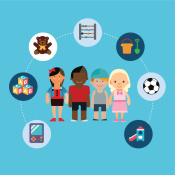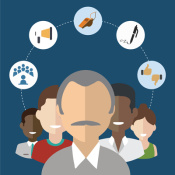Critical Information
The number of children ages 3 to 17 struggling with anxiety or depression rose by 1.5 million between 2016 and 2020. Educators trained in resilience will fortify their students and raise their potential for learning.
Two modes for promoting student resilience
Synchronous solutions…
include facilitated small group discussion, coaching, workshops, and more. Our unique web events include live group therapy, humor workshops to infuse fun into the classroom and even live events with comedians. Enjoy the video example.
Asynchronous solutions…
include on-demand video engagements on a range of topics from autism to dealing with difficult students. Faculty (and parents) can learn the rubric for developing greater resilience, will pass along this learning to students. Please enjoy this video montage on student engagement from our on-demand video library.
On-demand virtual engagements

Mindfulness Based Teaching Part II
The first steps to mindfulness involve heightening our awareness of self and how we are experienced by others. Our influence grows as we become more present, potent, and peaceful in the class.

Mindfulness Based Teaching Part III
Mindfulness Based Teaching is about improving your student's lives with greater enjoyment for your work. In your fast paced world of standards, learn how to balance process with content.

Mindfulness Based Teaching Part IV
Enacting change within a large group with minimal resistance is a goal of all educators. Learn how to influence a new generation of technology dependent students. Invigorate your class with energy.

Parenting Through Divorce Part I
This is part one of a two-part series on shared parenting after a divorce or separation. We discuss how to tell children and warning signs to look for.

Preventing Burnout Part II
Seeking pleasure or avoiding pain is the key question to consider when determining our risk of burnout. Learn how this question may intensify your stress.

Process Mentoring Part I
Mentoring a new teacher is a critical responsibility that shapes the role, attitude, beliefs, and skills for a career. Delve into your own belief system and relational style to thrive in this role.

Process Mentoring Part II
Mentoring can impact us both personally and professionally. Learn how to look inward to appreciate your biases and attitudes which may impact your mentee outside your awareness.

Recognition of Substance Abuse Part I
Consider common substance use patterns with children and teens across various substances. Learn how educators and parents play a role in the choices children make and our role in prevention efforts.
Success Stories

"Whole School Health Through Psychosocial Emotional Learning highlights the importance of relationships, communication, and compassion for others. It presents a critical view in supporting, training, and retaining teachers through the lens of engaging and modeling behaviors that will help our rural students be better civic leaders and community members. My favorite quote from the book gives credit to the author's upbringing and modeling from his parents: 'We must experience the world through others so we can fully engage in educating all children. My father and mother modeled to me and my siblings how to experience the world through somebody else’s eyes, especially if their outer differences stirred up discomfort or displeasure, enriching all lives involved.' I recommend all leaders, teachers, and stakeholders secure their copy as they prepare for school."
Allen Pratt, Executive Director, National Rural Education Association (NREA)